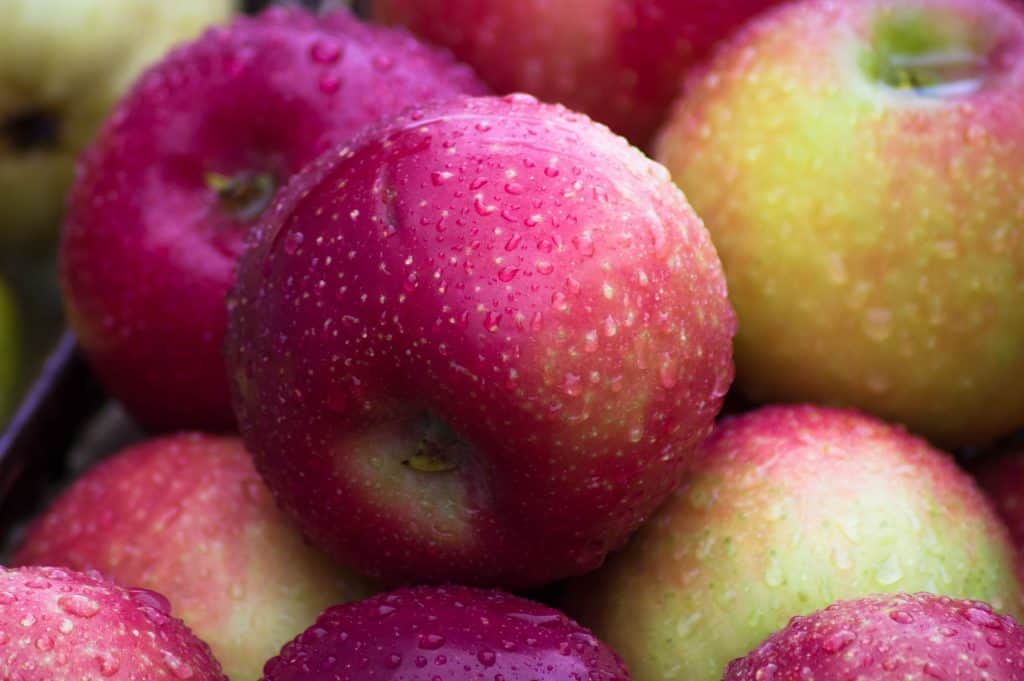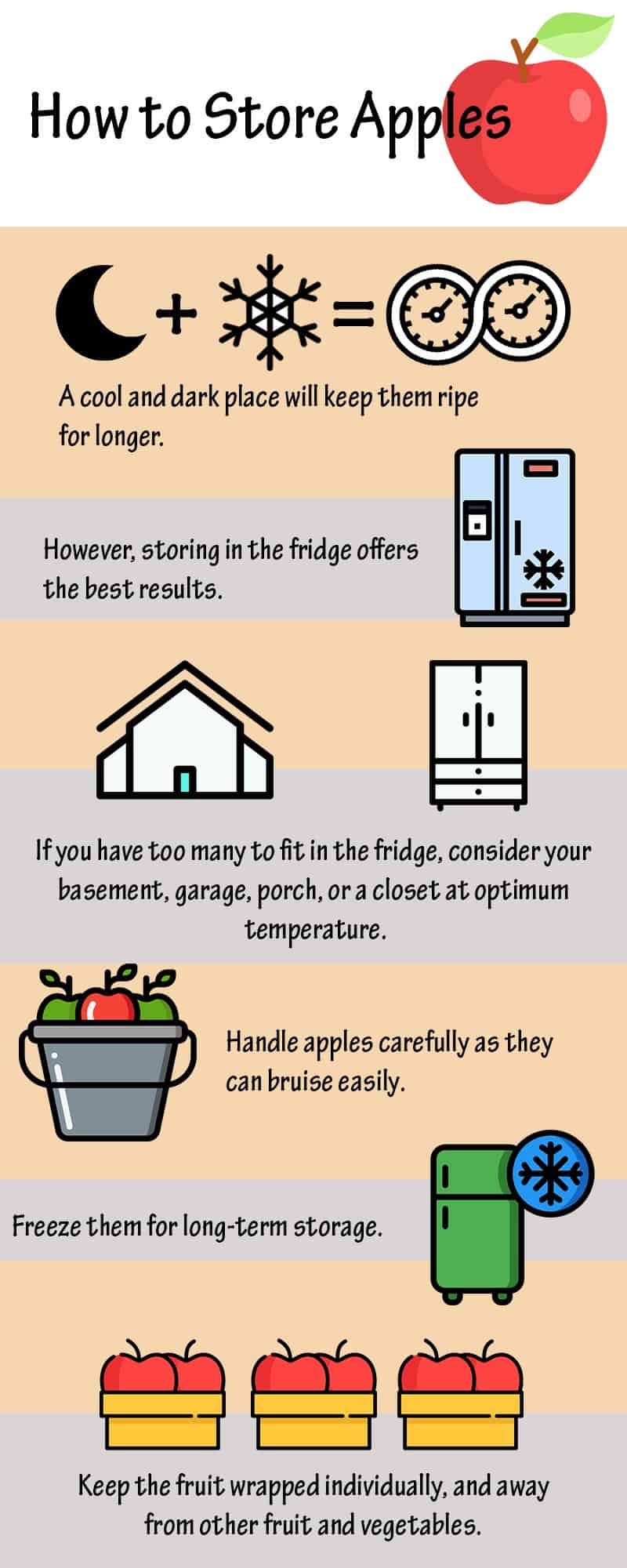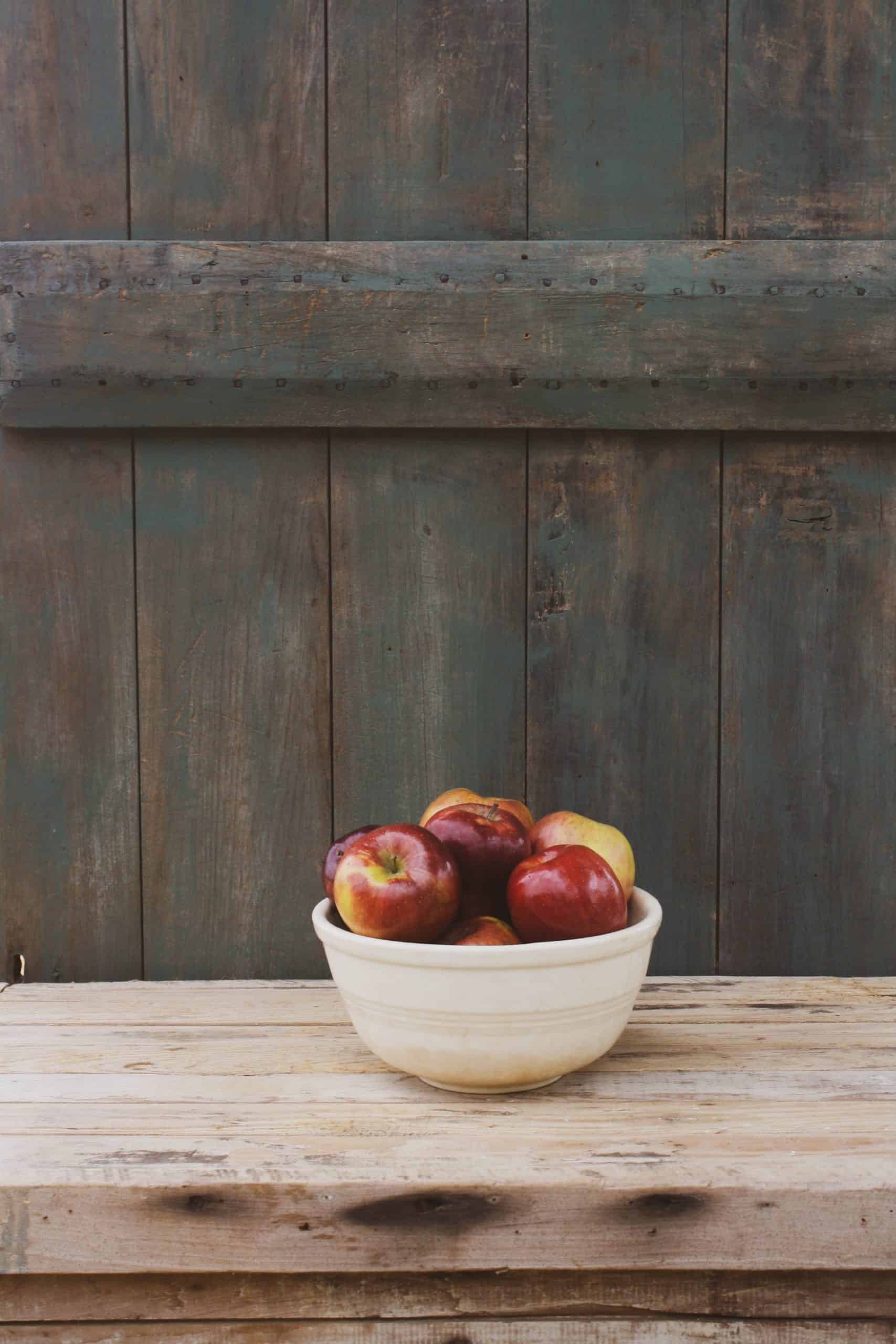It’s important to know the best way for storing apples so you can keep them fresher longer. Whether you bought them or picked them, no one likes mealy apples.
You may want to store apples for winter or just keep them firm to enjoy longer.
Here we discuss whether to keep them on the counter or in the fridge, how long apples keep, ways to store apples for a long time, and more.
These are the best ways to store apples to keep them fresh in a variety of conditions.
Tips on storing apples:
- A cool and dark place will keep them ripe for longer.
- Storing in the fridge offers the best results.
- For larger amounts, use the basement, garage, porch, or a closet at optimum temperature.
- Handle apples carefully as they can bruise easily.
- Freezing is an option.
- Keep the fruit wrapped individually, and away from other fruit and vegetables.

Choose the best-looking apples for storage and use the damaged ones straight away for eating, baking, cooking, eating, dehydrating, or juicing.
Do Apples Last Longer in the Fridge or on the Counter
Despite how you find apples in many grocery stores — typically on non-refrigerated shelves — apples last longer in the fridge than on the counter.
This is why it’s important to choose firm apples. When they aren’t refrigerated, apples easily become soft, mealy, or rotten.
The best place to store apples at home is in the refrigerator crisper drawer.
Storing Apples

To keep your apples fresh for the longest time possible, we suggest storing apples in the crisper drawer of your fridge.
Keeping them in a cool, dark environment will help them to stay crisp for the longest period so that they’re delicious and juicy when you come to eat them.
Storing Apples in the Fridge
There are several ways you can keep apples fresh in the fridge. Individually wrapping them when keeping them in the fridge will offer the freshest results.
You can wrap them in brown paper bags or newspaper.
While this isn’t always practical, it prevents them from touching one another, which can then spoil the entire bunch.
Do your best to give them a bit of space.
It’s also beneficial that they’re in a cold, dark place since they’re less likely to decay.

If you don’t have a vegetable drawer in your fridge, also known as a fruit or vegetable crisper, use a damp towel and place it on top of the fruit to retain their moisture and keep them fresher and juicier for longer.
Temperature in the Fridge
Store apples in the fridge at the lowest possible temperature to keep them crisp and fresh.
Store them between 31 and 35 degrees Fahrenheit for the best results possible.
Apples will begin to freeze if they reach 29 degrees Fahrenheit.
Keep Apples from Other Fruits and Vegetables
When keeping apples in the fridge, avoid making contact with other fruits and vegetables as they can begin to spoil and rot quicker.
If you have to keep other fruits and vegetables in the crisper drawer at the same time, wrap them in individual packaging.
Apples give off ethylene gas, so when they’re next to other fruits and vegetables, they’ll increase the decaying process.
You should avoid storing apples with onions and garlic as the strong odor can rub off onto the fruit, making them taste bad.
Potatoes also release gas, which can cause the apples to go off quickly and ruin their sweet taste.
How Long Can You Store Apples in the Refrigerator
When you store apples in the crisper, you can store apples for up to 60 days.
Should You Wash Apples Before Storing
If you are keeping them in the fridge or on the counter, you should not wash apples before storing.
Freezing Apples
It is possible to freeze apples, and when stored properly, they can last approximately 10 to 12 months. However, once you defrost them, they are best used for cooking and baking instead of eating raw.
When you store apples in the freezer, you can preserve their freshness by washing, peeling, and slicing the fruit first.
Place the apples in a heavy-duty freezer bag to keep them fresher for longer. As you seal the bag, be sure to release extra air. You don’t want the apples to have freezer burn. Keep the bag in the colder part of the freezer (in the back or on the bottom, depending on freezer type) and not near the door where temperatures will fluctuate.
If you want to take it a step further, coat the apples with ascorbic acid mixed with cold water to prevent them from darkening before freezing.
Keeping Apples in the Home
There are different places in the home where you can store apples for a long time while retaining their freshness. If you have a large number of apples, these cool and dark places will be ideal.
Basement
For optimum freshness, find the coldest place in your basement. You won’t want to store apples by vents.
Most basements tend to have high humidity levels, but if yours is near a heat source or you live in a dry area, you may wish to consider a humidifier to keep the apples fresh.
Alternatively, opt for a bottle filled with water and spray the apples a few times a month to keep them fresh.
Garage
Another popular setting for storing apples is in an unheated garage. You should bear in mind the garage’s temperature, so you don’t store apples in a room that’s too cold or too hot.
Generally, storing them in an area of your garage that’s closest to your house (if attached garage) will keep them warmer in the winter.
Cool Room
There will be one room in your house that’s cooler than the others, and a common choice is a closet. This is an ideal place to store apples for a long time, especially because it will remain dark.
You should consider if the room collects a lot of heat when the heating is switched on, too.
Porch
Many choose to store apples in an enclosed porch if they live in a climate that’s not too hot or cold. The area shouldn’t be freezing or too warm as the apples won’t remain fresh or crisp this way.
You should also avoid a porch that has direct sunlight. It’s also important to maintain stable temperatures.
Be sure to protect them from critters, such as rodents.

Store Apples for the Winter
If you wish to store apples for the winter, there are still ways to keep them fresh and retain their freshness.
Pick Unbruised Apples
The best place to start is by picking unblemished, ripe apples that aren’t yet bruised, so spend some time selecting the best from the bunch.
If the fruit is already bruised or cut, it’ll react with oxygen in the air and turn bad quickly. Consume these apples rather than store them.
You should also choose apples with stems as they’ll last longer than stemless fruit.
Take Care of the Apples
The next stage is to protect the apples for long-term storage. Take each apple and wrap it in a newspaper individually. Make sure you check the inks that are used on the paper as you want to avoid heavy toxic inks that contain chemicals and can make your food go bad quickly.
Another option is to wrap them in brown paper bags. You can cut up larger bags to protect the apples.
Alternatively, you can avoid individually wrapping the apples and place them in a crate or cardboard box with clean sawdust.

Regardless of how you store them, be sure to always thoroughly wash the fruit with clean, filtered water before eating.
Packing the Apples
Once you’ve collected them and chosen a location to store your apples, it’s time to place them in cardboard or wooden boxes or crates.
We recommend using multiple crates or boxes to store apples in rather than one or two large ones.
This is because you’ll need to regularly check their condition and having boxes packed tightly with fruit can make it hard to individually go through them all.
Alternatively, an apple storage rack makes checking them much easier.
Orchard Rack
An orchard rack or harvest rack is a great choice for storing apples in a basement, root cellar, cold storage room, shed or other cool, dry area. These open wooden racks are ideal for storing apples for long periods.
Orchard racks have slide out wooden drawers in which you place each apple in its own spot. In addition, the drawers have airflow to ensure proper air circulation.
In addition, you can use this type of wooden rack to store potatoes, pears, and other keeper crops.
Many orchard racks have removable shelves to create taller spaces for produce such as pumpkins, squash, etc.
Best Apples for Longer Storage
It’s not just the environment that affects the apple’s condition, but the type of apple you’re storing, too.
The best apples for longer storage include:
- Granny Smith
- Red Delicious
- Gala
- Fuji

Should You Cut Apples Before Storing Them?
It’s so disappointing when you slice apples in advance for a snack but then return to them, and they’re rotten and brown. For apples to retain their freshness, we suggest you keep them whole.

Though, if you wish to slice them in advance for a snack, you can use one of the methods below to prevent them from browning.
Water
The best way to prevent apples from browning is by reducing their exposure to air. You can do this by cutting apples into slices and storing them in water.
The slices will float, so you can place a clean towel on top to further reduce their exposure to air. Once the towel is wet, push the apples under the water.
Storing Apples in Saltwater
An alternative method to keep apples ripe with water is by mixing in ⅛ teaspoon of salt per one cup of filtered water. Don’t use any more salt than this. Once the salt dissolves, add the sliced apples to the water. Soak for 8 – 10 minutes. Drain the apples and store covered in your refrigerator’s crisper. They should keep for up to 24 hours.
Using sea salt or kosher salt if you have it, over table salt. However, table salt is okay too.
Before eating the slices, rinse the apples in fresh water for a couple of minutes to avoid a salty taste.
Honey
Another process to prevent browning is mixing two tablespoons of honey with one cup of water. Soak the apple slices into the mixture for around one minute.
Honey prevents enzymes from forming that are responsible for browning.
It’s also a delicious way to add further sweetness to the apples, though, you can rinse the fruit with fresh water after this process.
Pineapple Juice
Pineapple juice contains citric acid that helps to slow down the browning process, allowing your apples to stay fresher for longer.
You can add two tablespoons of juice to water and place the apple slices in the mixture. Another option is to squeeze pineapple juice, or other citric acid juice, directly onto the apple.
What Bowl Should You Use for Storing Apples?
If you’re in a situation where you don’t have access to a fridge, there are some factors you’ll need to consider.
First, bear in mind the environment. It should be dry, yet well-ventilated. When deciding which bowl to use, opt for ones that can be washed easily.
Plastic or glass are good choices. They will dry quickly and thoroughly.
Avoid wire baskets, since they create hard points on the fruit that can cause them to bruise—especially if you combine other fruits in the bowl.
Opt for padded bowls that cushion the fruit, helping to eliminate any pressure points that would ordinarily lead to bruising.
Swinging bowls are a great option because they hang freely and don’t make contact with other areas, allowing your fruit to remain fresh.
If you wish to use bins and containers, you should place them in a room you can access regularly as you’ll need to check the fruit often.
If you notice an apple becoming bruised, remove it immediately to prevent the gases from causing the remaining apples to rot.
Caring for Your Fruit Bowl
Should you discover an apple with mold or rot on it, toss it in your compost or feed to your livestock.
Remove the rest of the fruit and wipe down the container. Rinse with water and dry thoroughly before placing the fruit back.
Location for Your Bowl
Choosing a location for your fruit bowl is an important consideration to make, too.
First, it should be in a place where all family members can access healthy snacks throughout their day. Keep it on your kitchen countertop to encourage people to eat healthier.
To help your apples last longer, refrigerate the fruit bowl overnight. This will help to extend the apple’s freshness.
A kitchen can become a warm environment, so you’ll need to place the bowl in the refrigerator for longer periods during the summer or when you’re cooking hot meals.
You may also wish to place the fruit bowl close to the fridge or in cooler spots in the kitchen, so people have access to it, but your apples remain fresh.
How Long Do Apples Last?

Apples generally last five to seven days when stored at room temperature.
If you keep apples in these conditions for longer, they’ll begin to shrivel and lose their flavor.

When you store apples in the fridge, they can maintain their crispness and flavors for one to two months.
Harvesting Apples Before Storing Them
Harvesting apples at the perfect time is vital for maximizing their taste and increasing their storage life.
You can harvest different varieties at different times, depending on where you live.
In general, apples will ripen earlier in a sunny, mild fall. If you pick them too soon, the fruit will taste sour, while late harvesting results in soft, mushy fruit.
You will also need to watch for insects and birds.
Begin by testing the fruit for its texture. If it feels too hard and hasn’t developed a rich color and full size, it’ll require longer.
When your apples are ready, handle them carefully as they can bruise easily.
Storing Apples for Preparedness
When you are considering food storage for unique situations, apples are a good choice.
They will enable you to have access fresh foods in addition to canned and other packaged options.
Whether dehydrated, canned, or fresh, apples can be used in a variety of ways, including in recipes for baking and cooking.
Root Cellar
A root cellar is the ideal spot to store apples along with other foods. Root cellars use the earth’s natural cooling and insulation to preserve vegetables.
These are at least partially underground, often built into a slope or hillside.
They remain dark and cool throughout the year, which makes storing apples in root cellars ideal.
Making Apples Last Longer

When you buy apples, or even better when you grow them yourself, you want them to last as long as possible.
Perhaps you’ve harvested all your apples in one go and want to keep them fresh to enjoy them while ripe.
Store apples in the fridge away from other fruits and vegetables for optimum freshness.
Washing and individually wrapping them helps to retain their freshness and crispness.
You should regularly check on the condition of your apples during storage.
If you notice one piece of fruit has gone bad, remove it from the pack and make a delicious recipe.
You should then clean the storage container to prevent spreading any of the bad apples onto the remaining ones.
Consider the types of apples you buy or grow, too, as this will affect how long they last before rotting or becoming brown.
Storing apples property is important if you have apple trees or if you go apple picking. It’s also necessary when you buy them from the grocery store. You’ll want to keep them from becoming overripe too soon.
No one wants to eat bruised, brown and mealy apples. Learning apple storing techniques enables you to eat them fresh year round.
- Types of Oranges | What Varieties Are Best for Homesteading?
- How to Store Food Long Term
- Facing a Food Crisis: Realistic Ways to Prepare For Hard Times

